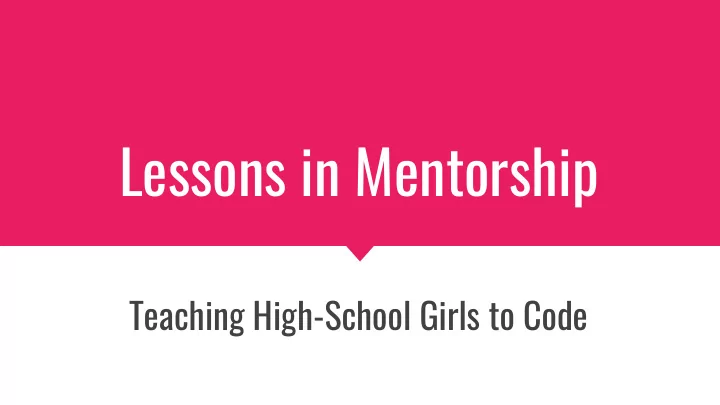

Lessons in Mentorship Teaching High-School Girls to Code
About the Speaker - Michael Starch ( 石大衛 ) Embedded Systems Engineer ● in Pasadena, CA, USA 4 years experience teaching ● high-school students San Marino High School ● Girls Who Code Club Teach Computer Programming, ● Electronic Circuits
Girls Who Code (GWC) at San Marino High School GWC: organization designed to encourage women to code ● Weekly after-school club focused on learning technology ● Open to all students; focus on teaching women ● Entirely voluntary ● Typically 3 mentors, 10-20 students ● Note: I do not speak on behalf of the “Girls Who Code” organization only for our local club at San Marino High-School.
Today’s Talk Our Challenges ● A Brief History of Our Club ● Successful and Unsuccessful Lessons ● Methods to Encourage Passion ● Handling Different Skill Levels ● Methods to Encourage Women ● General Advice ● Questions! ●
Challenges With Our Club Students are often absent due to conflicting priorities ● (classes, exams, family) Huge variation in skill-levels in the class ● Students are reserved and quiet ● Interests vary across class ● Many Students believe coding is too hard for them.
Supplied Lessons and Scratch: Year One Feedback: Used lessons based on Students were bored and ● ● Scratch, Khan Academy confused Provided to our club Mentors were disengaged ● ● Mentors only had general Little room for ● ● knowledge of the subject uniqueness
Overviews and Project-Based Lessons: Year 2 Feedback: Started year with a Students did not like ● ● survey of technology lecture format Transitioned into Workflows for projects ● ● project-based lessons were overly complex Provided by mentors of Long project duration ● ● club made absences difficult
Lesson Arcs and Smaller Phone Apps: Year 3 Feedback: Switched to shorter Short arcs make absences ● ● lesson arcs less problematic Created apps for use on Easier workflows eased ● ● Android phones lesson overhead Some off-topic lessons Felt limited in scope ● ●
Stand-Alone Lessons: Year 4 Feedback: Each lesson was Absences cause no ● ● independent of others problems at all Variety of lessons Students learned many ● ● across technology field topics Focused on interactive, Exploration cements ● ● exploration-based learning lessons
Successful and Unsuccessful Lessons Successes: Failures: Paper Circuits Lectures ● ● Pseudocoding Complex Instructions ● ● Hacking, Lock Picking, Small Classes ● ● and Security Sounds and Music ●
Methods for Inspiring Passion
Make Lessons Approachable Brief introductions ● prevent boredom Remove expert knowledge ● from the core lesson Put success first ● Example: pseudocoding teaches problem solving without syntax
Break The Norm Teach something no one ● else will teach Go against societal ● perceptions Surprise students with ● creative topics Example: hacking grabs students attention
Connect With Other Passions Students come with their ● own skills and passions Classes they take in ● school all benefit from technology Technology is everywhere ● Example: musical students thrive playing music with a microcontroller
Handling Difgerent Skill Levels
Focus on Exploration Self-exploration ● encourages personal connection Questions arise ● naturally Students have fun! ● Example: paper circuits have many paths that all lead to knowledge
Remember “Success Moments” Confidence comes from ● accomplishment Students remember when ● they succeeded Technology is ● demystified Example: a moving robot is a lasting memory
Encourage Questions I LOVE Questions ● Questions allow students ● to guide their education Questions betray ● misunderstandings Example: each year we have a question bounty
Methods for Encouraging Women
Granting a Voice Students can be afraid ● to talk or speak out “Granting a voice” is ● asking students to start a lesson with sharing Makes the classroom an ● open place to share Try it: ask students to share before a lesson
Creating a Focused Environment Know-it-all students ● establish unrealistic baseline Confidence can hide ● struggling students Try it: have students rotate rolls (pair programming)
Encouraging Inter-Student Learning Students know where ● students struggle most Seeing their peers makes ● lessons seem possible Helps make class more ● supportive Try it: ask knowledgeable students to help others
General Advice for Teaching
Embrace You The Mentor Your passion will be ● contagious You are an example of ● what they may become Question: what do you bring that no one else does?
Invest in Your Lessons Your lessons benefit ● from your hard work Be prepared for possible ● questions Learning can be fun for ● you too Question: what would make the lesson a learning moment for you?
Fear Not Teachers are invaluable ● You are not the only ● teacher of a given student Fear of failure may ● limit creativity Question: where might your fear limit students?
Conclusion
Things to Take With You Amaze students by attaching to their passions and ● challenging misconceptions. Encourage success, exploration, and questions. ● Understand students’ backgrounds to support their unique ● learning. Important for teaching women technology. Better yourself and it will better your students. ● Thank you! ●
Questions?
Extra Slides, For Potential Questions
Where Are We Headed
Handling Missing Students
Recommend
More recommend